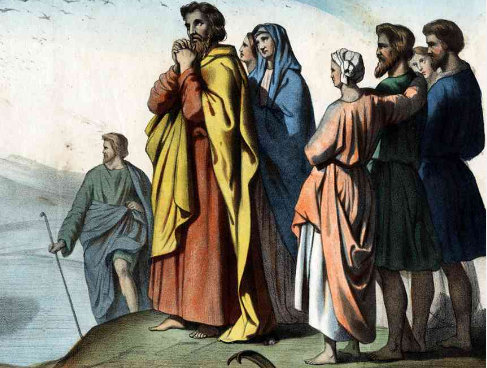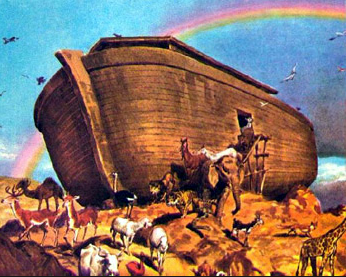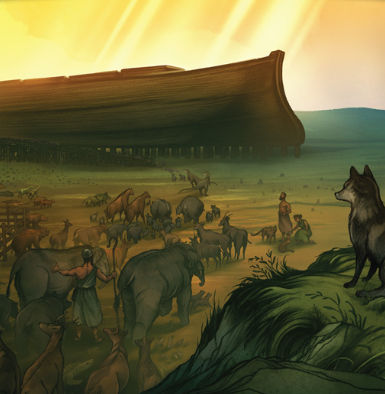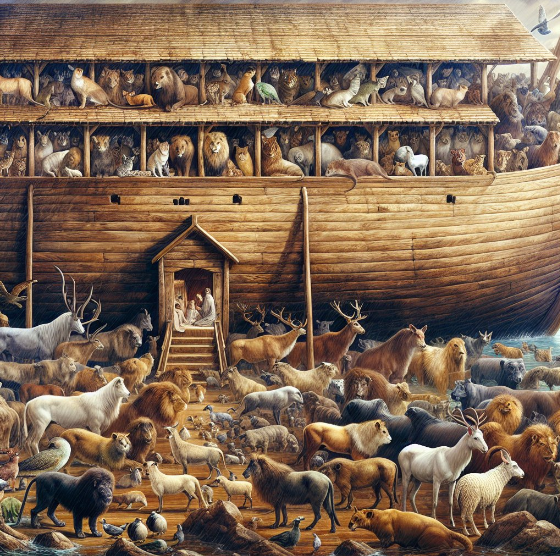God is bringing judgment upon the earth—upon animal, bird, and man.
Genesis 6:17-22 KJV
[17] And, behold, I, even I, do bring a flood of waters upon the earth, to destroy all flesh, wherein is the breath of life, from under heaven; and every thing that is in the earth shall die.
[18] But with thee will I establish my covenant; and thou shalt come into the ark, thou, and thy sons, and thy wife, and thy sons’ wives with thee.
[19] And of every living thing of all flesh, two of every sort shalt thou bring into the ark, to keep them alive with thee; they shall be male and female.
[20] Of fowls after their kind, and of cattle after their kind, of every creeping thing of the earth after his kind, two of every sort shall come unto thee, to keep them alive.
[21] And take thou unto thee of all food that is eaten, and thou shalt gather it to thee; and it shall be for food for thee, and for them.
[22] Thus did Noah; according to all that God commanded him, so did he.

Genesis 6:17
And, behold, I, even I, do bring a flood of waters upon the earth, to destroy all flesh, wherein is the breath of life, from under heaven; and every thing that is in the earth shall die.
Having provided instructions for the ark, God now identifies its purpose: the judgment He has decreed will take the form of a devastating flood.
The scale of the destruction parallels the scale of the sin, verse 13 indicates that violence and evil had become universal, and the verse at hand prescribes a universal flood as the remedy.
Scholars debate whether the term all flesh should be taken to mean that the flood was to be global, covering the entire earth, or regional, confined to one specific part of the world.
The latter interpretation emphasizes the fact that judgment is pronounced on and targeted at humanity.
And at this point, humans seem confined to a specific area of the world, signifying that all human life can be destroyed by a flood that affects only that region.
In either case, the scope of the devastation to come is clear; God intends to wipe out the entire human race, with just a few exceptions.
In prior verses, God has told Noah that He would put an end to all the people on the earth. This is due to their violence and evil (Genesis 6:5; Genesis 6:13).
After making this grave announcement, God gives Noah instructions about how to build an ark (Genesis 6:14–16). Those directions included the materials Noah should use, the dimensions of the ark, and the features it needed to have.
This verse, now, is actually the first time that God reveals how He will destroy all life. God will bring a killing flood to wipe out everything that breathes. All land-dwelling life will die. In some sense, this is God taking His creation back to a very literal “reset.”
In the beginning, God transformed the earth by bringing land and animals out of the water. In the flood, He will send the earth, at least symbolically, back into the state it was in prior to man’s creation.
This must have been overwhelming for Noah to hear. God is going to judge mankind by destroying almost all people. That judgment will wreak havoc on the animals and the land, as well.
Beyond that, only Noah and his family will survive, and only by constructing a massive ark. Indeed, it’s overwhelming for us to consider, all of these millennia later.
God is planning to exercise His authority as Creator and Lord of all the universe by delivering justice against human sinfulness and violence.
As the following verses will reveal, God will also demonstrate His grace by saving one human family and two of every animal so that created life will continue.

Genesis 6:18
But with thee will I establish my covenant; and thou shalt come into the ark, thou, and thy sons, and thy wife, and thy sons’ wives with thee.
The term covenant, appearing here for the first time in the Bible, is used in a way that specifically distinguishes faithful Noah and his family from the rest of the human race that will be destroyed.
Covenant means “contract.” This covenant implies that obedience to a sovereign ruler; in this case God; will result in protection and provision.
The terms of the agreement presuppose that Noah, as a servant of God, must follow the command to build and enter the ark; the implied reward is protection from the deh-lyooj – deluge, which Noah receives as a result of his obedience.
The explicit terms of the Noahic covenant are listed in Genesis 8:20–9:17.
The prior verse summarized God’s plan to wipe out all land-dwelling life on earth with a flood. Before that, God had given Noah instructions on building the huge ark which would carry man and animals to be spared.
Here, God specifically tells Noah that he and his family alone would be saved from the flood.
In doing so, God uses a word which will become important for God’s people forever: covenant. This term implies more than just a simple contract, or agreement. It carries the idea of a pledge and a promise.
God says that He will establish His covenant with Noah. In this case, God wants Noah to understand that the Lord is obligating Himself to save Noah and his family from the coming destruction.
The purpose of God using this language is trust. A covenant is a very solemn, serious obligation. Its worth is only as good as the person making it.
At the same time, it implies that the one making the covenant is staking their entire reputation on upholding their end of the bargain.
So, when God tells Noah He is making a covenant with him, it implies the most absolutely binding, serious kind of commitment. If Noah cannot place his trust in a covenant from God, he can’t place his trust in anything.
God’s covenant with Noah—and through Noah with humanity to follow—will be further developed in the coming chapters.

Genesis 6:19
And of every living thing of all flesh, two of every sort shalt thou bring into the ark, to keep them alive with thee; they shall be male and female.
The terms of Noah’s obedience to God’s covenant continue, now regarding the plan for preserving animal life. These instructions cover the full range of creatures.
“Two of every sort shall come unto thee, to keep them alive.” Noah was not a Frank Buck who went out “to bring ’em back alive.”
He was not a big game hunter. He did not have to go after these animals—they came to him. Animals in danger will do that. When an animal is in danger, they will come to man.
At the time of the Flood, I do not think Noah had any problem at all, for the animals all came to him.
God has revealed to Noah that He will wipe out all land-dwelling life on earth with a great flood. The reason for this is the pervasive wickedness of mankind (Genesis 6:5; Genesis 6:11–12).
He has given Noah instructions about building an ark, a huge structure meant to float while carrying men and animals. Most importantly, God told Noah that he and his family would be saved from the flood by entering the ark.
In doing so, God says he will make a covenant with Noah. This implies the most serious, solemn kind of promise.
Here, God gives Noah a truly remarkable command: Bring a pair of each kind of animal with you in the ark. For those in the modern era, particularly those in the west, we may be so familiar with the story that the enormity of this command doesn’t affect us.
And yet, it must have sounded daunting to Noah. Not only is he being tasked with building an enormous box, but he has to put an enormous number of animals into it! Fortunately, God will later suggest that the animals will come on their own (Genesis 6:20).
As we will see in the next verse, though, God’s command was motivated by God’s desire to preserve the good creation that He had made for future generations.
This, again, shows God’s plan to preserve humanity. Rather than simply obliterate life, and the human race, God graciously provides to help heal from this catastrophe.
This command is universal: Noah will bring two of every kind. Just a few verses from now, God will provide more specific instructions regarding “clean” animals, which will require seven pairs each (Genesis 7:2).

Genesis 6:20
Of fowls after their kind, and of cattle after their kind, of every creeping thing of the earth after his kind, two of every sort shall come unto thee, to keep them alive.
It will be physically impossible for Noah to capture a mating pair of each and every species. The fact will leave room for another miraculous display of God’s power as He will compel healthy representatives to come into the ark.
The note that the animals will come in pairs of male and female reflects their purpose of repopulation. These instructions are further clarified in Genesis 7:1–3.
Skeptics who doubt the truth of the biblical narrative question the ark’s ability to accommodate eight humans and representatives of all animal species of land and air.
They generally approach the question by noting the number of species extant today and arguing that Noah’s ark was not big enough to hold them all.
The biblical account, however, takes the opposite approach: only those animals who travel on the ark will survive the flood.
In the previous verse, God commanded Noah to bring into the ark with him and his family a male/female pair of every kind of animal. Now God expands and clarifies the command.
First, the animals will include birds, insects, and every other kind of land-dwelling animal. Second, all of these animals would come to Noah to be kept alive.
These creatures would have been necessary to re-populate and replenish the land ravaged by the upcoming flood.
With the addition of the detail that the animals would come to him, Noah’s impossible task of building the ark and collecting the animals becomes a little less impossible.
God would exercise His supernatural authority over the animals to direct specific pairs to come to the ark to be saved from the flood. Noah isn’t being asked to scour the earth capturing unwilling animals.
He’s being asked to prepare an ark for the ones which come to him. That’s still daunting, but much more within the abilities of one man.
We see in this command that God’s response to the great wickedness of humanity is not simply to destroy all life, but to preserve life, as well, for a new beginning. The flood is not an act of revenge, but of drastic healing.

Genesis 6:21
And take thou unto thee of all food that is eaten, and thou shalt gather it to thee; and it shall be for food for thee, and for them.
As a final instruction, Noah is commanded to stock the ark with supplies for his family and the animals. Comparing Genesis 7:11 with 8:3–14 indicates that they were in the ark for more than a year.
Noah is now to do something very practical. It took a lot of hay in the ark to feed these animals. Some people are going to say, “But some of those animals ate meat. They would eat each other!” I do not think so.
Up to the time of the Flood, apparently both men and animals were not flesh-eating. They just did not eat flesh; there were no carnivorous animals. We are told of a day in the Millennium when the lion and the lamb will lie down together, and the lion will eat straw like an ox (see Isa. 11:6–7).
That could certainly come to pass, for that probably was the original state of the animals in the first place.
God’s last instruction to Noah in this extended passage has to do with the practical matter of food. In addition to building the ark and planning for all the animals that will come to the ark to be saved, Noah must consider what food will be necessary for the journey.
He and his family will need to acquire and store every kind of food that the animals, birds, and insects will need to eat, and they will need to stockpile enough of it to last for the duration of the trip.
As with other parts of the story, specific details are not given. We don’t know what specific kinds of foods were to be brought. All we know is that God’s covenant promise to save Noah and his family would require Noah to accept certain responsibilities.
Among these are the need to build, plan, store, schedule, and do all the work necessary to be prepared when the floodwaters came.
Genesis 6:22
Thus did Noah; according to all that God commanded him, so did he.
Now aware of the forthcoming reality of the annihilation of the human race, Noah proceeds with God’s intricate instructions. The action God intends to take is unprecedented, and we wonder if this quickens the pace of construction.
We don’t know. This part of the story merely concludes with a simple statement of Noah’s obedience. Just as he has distinguished himself throughout his life by his righteous conduct, he now distinguishes himself by his full and unquestioning obedience to God’s commands.
This aspect of Noah’s story is highlighted in Hebrews 11:7, part of a listing known as the Faith Hall of Fame.
By faith Noah, being warned of God of things not seen as yet, moved with fear, prepared an ark to the saving of his house; by the which he condemned the world, and became heir of the righteousness which is by faith.
In this passage, God has given Noah a colossal set of tasks. He is to build a container longer than a football field and taller than a four-story building. He is to make room inside for pairs of every kind of insect and animal.
He is to prepare food for his family and these animals. And, the reason for this is so that those inside the ark can survive God’s upcoming judgment on a wicked human race: a catastrophic flood of water.
Given all of that, this verse is remarkable in and of itself. Noah demonstrates his faith in and submission to God by simply obeying. He did everything God had commanded, and he did it “just as” God commanded it.
We are given very few details in this passage. Surely, Noah was told more in person than we are in this passage. And yet, there is no doubt that Noah would have had many, many questions and concerns.
But, despite these, he acts according to the commands of God. We were told in the beginning of this section (Genesis 6:9) that Noah was a righteous, blameless man who walked faithfully with God. This verse is evidence of that profound faithfulness.
I hope that you have really enjoyed this post,
Please Leave All Comments in the Comment Box Below ↓













It is wonderful to read a commentary on each verse of the creation story.
As you point out, there are different views on the Biblical account. The nature of the relationship between creator and creation as demonstrated by Noah is main point.
There were specific instructions to be followed for the relationship to continue. These instructions were followed. There is also the point that mankind is responsible for the rest of the created order as was Noah.
Thank you for the overview of this passage.
Hello again Anastazja,
Thank you for continuing to take the time to comment on this episode. I agree, the instructions were specific, indeed.
You are welcome for the overview of this passage.
Blessings My Friend!
Thank you for sharing this detailed and insightful commentary on the verses from Genesis. It’s evident that you’ve put thought into understanding the context, symbolism, and significance of these passages.
The story of Noah and the ark is a remarkable one that holds deep theological and moral implications. It showcases both the justice and grace of God, as well as the faith and obedience of Noah.
The flood represents a divine judgment upon the wickedness and violence that had permeated humanity at that time.
Hello again Anoth,
Thank you for taking another opportunity to comment on another HBS & DwJ Podcast episode, derived from the information in this website.
Your opinion on this topic, as well as all of the others you comment on, is very much appreciated.
Blessings My Friend!
This article explores the passage in Genesis 6:17-22 which describes God’s plan to bring judgment upon the earth through a devastating flood.
It highlights the scale of destruction and the universal nature of the flood as a response to the widespread sin and violence among humanity.
The article also discusses the covenant that God establishes with Noah, setting him and his family apart from the rest of humanity. The covenant signifies God’s promise of protection and provision for those who obey Him.
Furthermore, the article emphasizes the instructions given to Noah regarding the preservation of animal life, with pairs of each kind being brought into the ark. It acknowledges the challenges faced by Noah in carrying out these tasks, but also highlights his unwavering obedience and faithfulness to God’s commands.
Overall, the article presents a reflection on the profound faith and trust demonstrated by Noah in the face of God’s judgment and grace.
Hello Jason,
Thank you for sharing your thoughts and comments about this Passengers In The Ark – All That GOD Commanded episode.
I think going into deep details about these studies helps to answer questions as readers continue reading. Your detailed comment is definitely appreciated, as it adds to the information already provided, making this community of study greater.
Thank you so much, looking forward to hearing from you more in future comments.
Blessings My Friend!
As a newcomer to the topic of biblical narratives, I find the concept of God bringing judgment upon the earth through a flood to be quite intriguing.
The passage you’ve shared from Genesis details God’s plan to destroy all flesh on earth with a devastating flood, except for a few exceptions like Noah and his family. I’m curious about the term “covenant” that is mentioned in Genesis 6:18.
Could you explain what a covenant means in this context and how it relates to God’s promise to protect and provide for Noah and his family?
I’m trying to understand the significance of this covenant and how it plays a role in the overall narrative of the flood.
Thank you for sharing your insights!
Hello skamalka,
Thanks for stopping by the HBS & DwJ website, turned podcast.
The prior verse summarized God’s plan to wipe out all land-dwelling life on earth with a flood. Before that, God had given Noah instructions on building the huge ark which would carry man and animals to be spared. Here, God specifically tells Noah that he and his family alone would be saved from the flood.
In doing so, God uses a word which will become important for God’s people forever: covenant. This term implies more than just a simple contract, or agreement. It carries the idea of a pledge and a promise. God says that He will establish His covenant with Noah. In this case, God wants Noah to understand that the Lord is obligating Himself to save Noah and his family from the coming destruction.
The purpose of God using this language is trust. A covenant is a very solemn, serious obligation. Its worth is only as good as the person making it. At the same time, it implies that the one making the covenant is staking their entire reputation on upholding their end of the bargain. So, when God tells Noah He is making a covenant with him, it implies the most absolutely binding, serious kind of commitment. If Noah cannot place his trust in a covenant from God, he can’t place his trust in anything.
God’s covenant with Noah—and through Noah with humanity to follow—will be further developed in the coming chapters.
Blessing My Friend!
All I have to say is, WOW!
Your website is amazing and PACKED full of information. I have never been to a site that is so informative and easy to navigate. You have obviously taken the time to put in some great content. I love the side bar that allows you to access your blog posts that are relevant to your site and will give visitors guidance on your site and in life.
I’ve always been interested in other people’s take on the Holy bible and you make it easy to understand and learn. Great job!!!
The only criticism I would have would be your reviews. Maybe offer some insight on which bible would be best for beginners, like a study bible. I know I was searching for one and the one I ended up getting isn’t exactly great or informative.
Having product reviews relevant to your content would be huge!
Maybe even doing one for a devotional journal or things of that nature.
Hope this helped!
Hello Steph,
Welcome to the HBS & DwJ Platform.
I was looking forward to reading your comment about the Passengers In The Ark – All That GOD Commanded episode that would add additional value to it.
However, your constructive criticism about the Website itself, is very thoughtful. Having product reviews similar to my LET’S HAVE CHURCH!!! – Review would be huge!
Since everything is pretty much done in Apps these days, maybe I could look into the best Holy Bible Study Apps that would benefit beginners. If you have any suggestions, feel free to inform me.
I definitely appreciate your helpful advice,
Blessings My Friend!